- Home
- Susan Beth Pfeffer
Life As We Knew It lawki-1 Page 3
Life As We Knew It lawki-1 Read online
Page 3
Mom started crying. Jonny was just staring at the TV like it was broadcasting in a foreign language.
I got up and tried Dad again. Then I tried Grandma. But all I got was the busy-circuit signal.
“We’re getting an unconfirmed report that all of Cape Cod has been flooded,” the newsman said. “Again, this is unconfirmed. But the AP is reporting that Cape Cod,”—and he paused for a moment and swallowed —“that Cape Cod has been completely submerged. The same seems to be true of the barrier islands off the Carolina coast. Just gone.” He stopped again to listen to whatever was being said through his earpiece. “All right. There is confirmation of massive damage to Miami. Many deaths, many casualties.”
“We don’t know what he’s saying is true,” Mom said. “Things get exaggerated. Tomorrow morning we may find out all this didn’t really happen. Or if it did, it wasn’t nearly as bad as they thought it was. Maybe we should just turn the TV off now and wait until tomorrow to see what really happened. We may be scaring ourselves for no reason whatsoever.”
Only she didn’t turn the TV off.
“There’s no way of knowing the number of deaths,” the newsman said. “Communication satellites are down. Telephone lines are down. We’re trying to get an astronomer from Drexel to come to our studio and tell us what he thinks is happening, but as you can imagine, astronomers are pretty busy right now. All right. We seem to be getting a national feed again, so we’re cutting to our national news bureau for a live update.” And there, suddenly, was the NBC anchorman, looking reassuring and professional and alive.
“We’re expecting word from the White House momentarily,” he said. “Early reports are of massive damage to all the major cities on the eastern seaboard. I’m coming to you from Washington, D.C. We have been unable to make contact with our New York City headquarters for the past hour. But here’s the information as we have it. Everything I’m going to announce has been verified by two sources.”
It was like one of those lists on the radio to let you know which schools were having snow days. Only instead of it being school districts in the area, it was whole cities, and it wasn’t just snow.
“New York City has suffered massive damage,” the anchor said. “Staten Island and the eastern section of Long Island are completely submerged. Cape Cod, Nantucket, and Martha’s Vineyard are no longer visible. Providence, Rhode Island—in fact, most of Rhode Island—can no longer be seen. The islands off the coast of the Carolinas are gone. Miami and Fort Lauderdale are being battered. There seems to be no letting up. We’ve now had confirmation of massive flooding in New Haven and Atlantic City. Casualties on the eastern seaboard are believed to be in the hundreds of thousands. Naturally it is far too early to tell if that number is excessive. We can only pray that it is.”
And then, out of nowhere, was the president. Mom hates him like she hates Fox News, but she sat there transfixed.
“I am broadcasting to you from my ranch in Texas,” the president said. “The United States has suffered its worst tragedy. But we are a great people and we will place our faith in God and extend a helping hand to all who need us.”
“Idiot,” Mom muttered, and she sounded so normal we all laughed.
I got up again and tried the phone with no luck. By the time I got back, Mom had turned the TV off. “We’re fine,” she said. “We’re well inland. I’ll keep the radio on, so if there’s any call for evacuation, I’ll hear it, but I don’t think there will be. And yes, Jonny, you have to go to school tomorrow.”
Only this time we didn’t laugh.
I said good night and went to my bedroom. I’ve kept the clock radio on, and I keep hearing reports. The tides seem to have pulled back from the East Coast, but now they’re saying the Pacific is being affected also. San Francisco, they say, and they’re afraid for LA and San Diego. There was one report that Hawaii is gone and parts of Alaska, but no one knows that for sure yet.
I looked out my window just now. I tried to look at the moon, but it scares me.
Chapter Three
May 19
I woke up around 6 to the sound of the phone ringing. I threw on my robe and went to Mom’s room.
“It’s your father,” she said, and handed me the phone.
Right after Mom and Dad split up, I got it into my head I’d never see him or hear from him again, and every time he called, I’d get this ridiculous sensation of relief. I felt the exact same way, like a hundred-pound weight had just flown out of my stomach.
“Are you okay?” I asked. “And Lisa? Is she all right?”
“We’re both fine,” he said. “Your mother says everything is fine where you are and that you heard from Matt last night.”
“That’s right,” I said. “We tried and tried to reach you and Grandma last night and the circuits were all busy.”
“I reached her late last night,” Dad said. “She’s fine. A little shaken up, but that’s natural enough. We’re lucky, Miranda. We all seem to have made it, no problem.”
“I feel like it should have been a dream,” I said. “Like maybe I’m still dreaming and when I wake up none of it will have happened.”
“That’s how we all feel,” he said. “Your mother says school hasn’t been canceled. I guess the idea is for us to get on with our lives and be grateful that we can.”
“All right,” I said. “I can take a hint. Give my love to Lisa, okay? Tell her I was thinking about her and the baby.”
“I will,” he said. “I love you, honey.”
“I love you too, Daddy,” I said. I gestured to Mom to see if she wanted the phone back, but she shook her head, so I hung up.
“How late did you stay up?” I asked. “Did anything else happen?”
“I went to bed around the same time you did,” she said. “I saw you turn your light out. I didn’t sleep very well, though, kept waking up and turning the radio on, that kind of thing.”
“Did the tides stop?” I asked. “Did the flooding stop?”
“They stopped, they started,” Mom said. “It’s very bad.” She kind of laughed. “Very bad doesn’t really describe it. Catastrophic. They don’t know how bad the damage is yet, how many countries were affected.”
“Countries?” I said. Somehow I’d forgotten there were other countries, that we shared the moon with other countries.
“I don’t know,” Mom said. “They don’t know. Nobody knows. Holland was decimated; they’re pretty sure about that. Australia: Most of the cities there are on the coast, so it was very badly hit. The tides just went mad. They think the asteroid was denser than they’d assumed it would be, so the collision was bigger. They think the moon got knocked off kilter, got pushed a little closer to the earth. At least that was the theory around five.”
“But it’s not going to crash into earth,” I said. “We’re okay, right? We don’t live that close to the ocean.”
“They’re sure it won’t crash into the earth,” Mom said. “At least not in the foreseeable future. Beyond that, I don’t think anybody’s predicting anything.”
It was funny. I was actually glad school was still on, like that proved we’d be okay. I left Mom and took a shower, and by the time I dressed and went downstairs, Mom had already started breakfast and I could hear Jonny moving around.
Mom made pancakes, which she never does on a school day. I didn’t think I’d have any appetite, but I ate more than my share. So did Jonny. I don’t remember seeing Mom eat any, but there was some batter left, so maybe she made some for herself after we left.
When I went outside to wait for the bus, I looked up, and I could see the moon in the morning sky. It was still bigger than it should have been, and it didn’t seem quite as washed out as it usually looks in the daytime. I stopped looking at it, and concentrated on the dogwoods instead.
On the bus, all anybody talked about was what happened last night. Not that anyone really seemed to know or understand. A couple of the kids seemed to think it was cool, and a couple of girls were crying the
whole trip.
I sat next to Sammi, but she didn’t say much. Megan didn’t get on the bus, and neither did her church friends. The bus was only half full.
I hated the kids who were acting like it was all a big joke.
There were a lot of kids missing from homeroom, too, but most of the teachers seemed to have shown up. We’d just started history when the first lightning bolt landed. It flashed so brightly the whole classroom seemed illuminated. The thunder followed, loud enough to shake the building. At least one kid screamed, and I was just glad it wasn’t me.
Ms. Hammish tried to pretend the storm wasn’t happening, but there was no way we could avoid talking about the moon. She asked how many of us knew someone who lived on one of the coasts, who might have been affected.
All our hands went up.
“I don’t actually know someone who lives there,” Michelle Webster said. “But I feel like I do, because all the stars live in Hollywood or in New York, and I know I don’t know them, but I feel like I do.”
A lot of the kids said they felt that way too. I guess Ms. Hammish was going to tell us that was a normal way to feel, but then a lightning bolt hit one of the trees right outside the school grounds. The tree burst into flames, and then we lost our electricity.
A lot of kids started screaming then. Michelle began sobbing, real hysterical sobs, and other kids started crying, too. Sarah pulled out her cell phone to call home maybe or 911 but she couldn’t get a connection and she threw the cell phone across the room. The thunder kept rolling, and the tree began to smolder from the fire and the rain.
It was weird. There was all this craziness going on around me, and Ms. Hammish was trying to calm everybody down, only we could hardly hear her, because the thunder was so loud, and kids all over the school were screaming, so it wasn’t just our classroom, and I didn’t feel anything. I wasn’t screaming or crying. I was just noticing things, how the winds had picked up, and branches were flying around outside, and how the storm didn’t seem to be letting up any.
Ms. Hammish must have decided it was a tornado, because she told all of us to get up and go into the hallway. I don’t know how many of the kids heard her, but I did, and I got up and started walking around the classroom, lifting the other kids out of the seats, until they all figured out what we were supposed to do. By the time we’d evacuated the room, there were lots of kids sitting on the hallway floor, and we joined them.
I kind of missed being able to see the storm. I didn’t feel like it was a tornado. I felt like the world was coming to an end, and I was going to miss all the action, because I was going to be sitting on the hallway floor when it did.
And then I thought, Well, that’s typical, I can’t even get any action when the world’s coming to an end, and I started laughing. It wasn’t hysterical laughing (it really was funny that the world was coming to an end and I still couldn’t get any action), but once I started, I couldn’t stop. Other kids were laughing, too, so the hallway consisted of kids laughing and kids crying and kids screaming and teachers walking around and checking classrooms to make sure they were empty. The hallway was completely dark, except for the flashes of lightning we could see from the classroom windows.
I managed to stop laughing, but then I thought, at least nobody’s singing “The Star Spangled Banner,” and I started laughing all over again. The phrase “By the dawn’s early light” got stuck in my mind, and I kept hearing it over and over again. “By the dawn’s early light.” “By the dawn’s early light.” I wondered how many people had sung “By the dawn’s early light” yesterday and were dead today.
We were in the hallway for almost an hour. It’s hard to stay hysterical for that long, and by the time the hour was over, and the storm had died down, almost all the kids were quiet, except for one girl who kept screaming, “I don’t want to die!”
Like any of us did.
We went back into our second-period classrooms, even though it was already fourth period. It was still raining with thunder and lightning, but the winds had calmed down, and the lightning was farther away.
Some of the kids who’d been crying were just shaking. The electricity still wasn’t on, and with the lightning not striking so close or so frequently, things were actually darker in the classroom. The sky was still a mean gray, and I think we all felt like the storm could come back at any moment full tilt and we’d be back in the hallway. Ms. Hammish didn’t tell us to go to our fourth-period classes. We all just sat there instead.
I couldn’t totally shake “By the dawn’s early light” from my head, and I was kind of wishing Ms. Hammish would distract us with a history lesson, when in walked Mom.
She was soaking wet and looked wild and determined. I thought, something’s happened to Matt, and that stomach weight came right back like it had never been gone.
“Come on, Miranda,” Mom said. “Get your books and let’s get going.”
Ms. Hammish stared at her, but she didn’t say anything. I got my books and followed Mom out of the classroom.
I thought, If I don’t ask what happened, it won’t have happened, so I kept quiet as we left school. Mom didn’t say anything, either. The rain was pouring, and the thunder was still pretty loud, and I thought the world really is coming to an end, and Mom wants me home when that happens.
We ran to the parking lot, and Jonny opened the door for me. I jumped in, and I was surprised to see Mrs. Nesbitt sitting in the passenger seat. I could see Mom not wanting Mrs. Nesbitt to be alone when the world ended, but I couldn’t figure out why she had to be driven somewhere first.
“Here, Miranda, take this,” Mom said, and she handed me an envelope. I looked inside it and saw ten $50 bills.
Mom started the car. I looked at Jonny, who just shrugged.
“When we get to the supermarket, I want Jonny to go to the pet food department,” Mom said. “Jonny, you know what Horton’ll eat. Get kitty litter, too, and put the bags on the bottom of the wagon. Get the biggest bags that’ll fit there. Fill the wagon with as many bags of dry food as you can.”
“Horton likes canned,” Jonny said.
“Get the little ones,” Mom said. “The expensive kind. As many as you can throw into the empty spaces. Fill the wagon as high as you can possibly can. And Mrs. Nesbitt, when you get the paper goods, don’t forget Tampax for Miranda and me. Lots of boxes.”
“Thanks for reminding me,” Mrs. Nesbitt said.
“What’s going on?” I asked. “Would someone please tell me?”
“It’s just in case the world’s coming to an end,” Jonny said. “Mom wants us to be ready.”
“I went to the bank this morning,” Mom said. “And I filled the gas tank and gas was already at five dollars a gallon. I went to the supermarket and the electricity went out and there was chaos there, so they just said a hundred dollars for each wagon no matter what was in it. I had a lot of cash on me, so I filled a wagon and then I went back and got Mrs. Nesbitt and then Jonny and you so we could each get wagons to fill.”
“You don’t really think we’re going to need this stuff?” I asked. “Everything’s going to get back to normal soon, isn’t it?”
“Not in my lifetime,” Mrs. Nesbitt said.
“We don’t know,” Mom said. “But kitty litter doesn’t go bad. If it turns out I’m wrong and I’ve wasted all this money, fine. I’d just as soon the world gets back to normal. But in case it takes a while, we might as well have toilet paper. Miranda, you’re going to canned vegetables and fruits. You know what we like.”
“Mom, we don’t eat canned vegetables,” I said.
“We do now,” she said. “Canned vegetables. Fruits. Soups, too. Lots of cans of soup. Find the cartons in the back of the car and put them on the bottom shelf of the cart. Fill those cartons up too. Get as much as you can in the wagon.”
I stared out the window. The rain was still falling and occasional flashes of lightning could be seen in the distance. The electricity was still out, so corners with traffic lights
were crazy, with cars stopping and starting and not knowing what exactly to do. I saw a lot of trees had fallen, and cars were driving over the smaller branches that littered the streets.
Mom just plowed through.
“What about desserts?” I asked. “If the world comes to an end, I’m going to want cookies.”
“We’re all going to want cookies if the world comes to an end,” Mrs. Nesbitt agreed. “And chips and pretzels. If the world is coming to an end, why should I care about my blood pressure?”
“Okay, we’ll die fat,” Mom said. “Grab what you can grab and ram it into your wagons. But remember if we actually need this stuff, we’re going to be a lot more grateful for a can of soup than for a box of stale cookies.”
“Speak for yourself,” Mrs. Nesbitt said.
“Get Progresso,” Mom said. “They don’t need water.”
“Mom,” I said. “We have water.”
“Which reminds me,” she said. “After you pay for your first wagons, put the stuff in the car and go back.
Jonny, you get water. As many bottles as you can fit in. Mrs. Nesbitt, you get whatever you think you’re going to want. Miranda, you go to health and beauty aids. Get aspirin and peroxide and Band-Aids.”
“Great,” I said. “The world’s coming to an end, and we’re fixing it with Band-Aids.”
“Vitamins,” Mom said. “Get lots and lots of vitamins. And laxatives. Calcium. Vitamin D. This is so hard, trying to remember everything we might need.”
“Or might not,” I said. “Mom, I love you, but I think this is crazy.”
“So we’ll all get vitamin D for Christmas presents,” Mom said. “Just do it, okay. Jonny and Mrs. Nesbitt and I have car keys, so wait for one of us to show up, and we’ll put your stuff in with theirs. Okay?”
“Sure,” I said, because I decided it was better to humor her.
“After we finish our second loads, we’ll see what it’s like,” Mom said. “Then we’ll see if it’s worth it to go back in.”

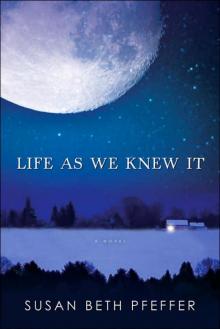 Last Survivors 01 - Life as We Knew It
Last Survivors 01 - Life as We Knew It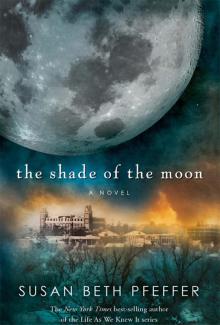 Last Survivors 04: Shade of the Moon
Last Survivors 04: Shade of the Moon Thea at Sixteen
Thea at Sixteen Kid Power
Kid Power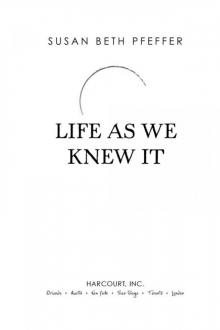 Life as We Knew It
Life as We Knew It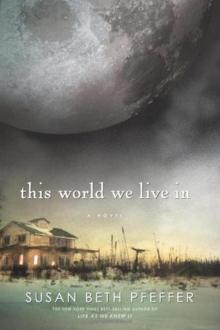 This World We Live In
This World We Live In Meg at Sixteen
Meg at Sixteen Blood Wounds
Blood Wounds The Beauty Queen
The Beauty Queen Most Precious Blood
Most Precious Blood The Dead and the Gone
The Dead and the Gone Sybil at Sixteen
Sybil at Sixteen Evvie at Sixteen
Evvie at Sixteen Getting Even
Getting Even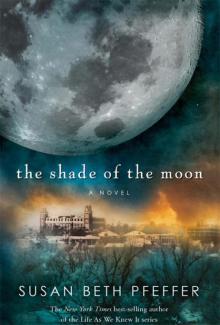 Shade of the Moon ls-4
Shade of the Moon ls-4 The Dead and Gone
The Dead and Gone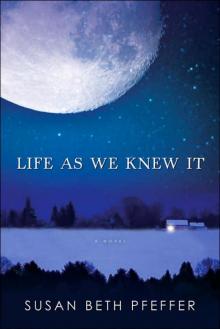 Life As We Knew It lawki-1
Life As We Knew It lawki-1 Fantasy Summer
Fantasy Summer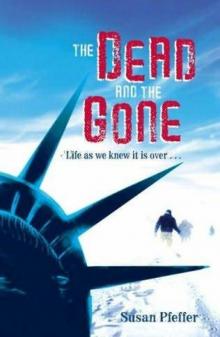 The Dead and the Gone ls-2
The Dead and the Gone ls-2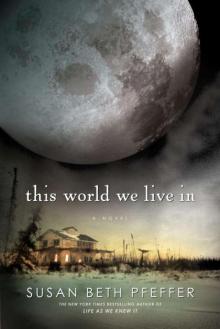 This World We Live In ls-3
This World We Live In ls-3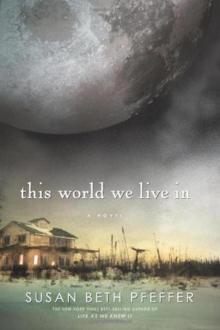 This World We Live In (The Last Survivors, Book 3)
This World We Live In (The Last Survivors, Book 3)